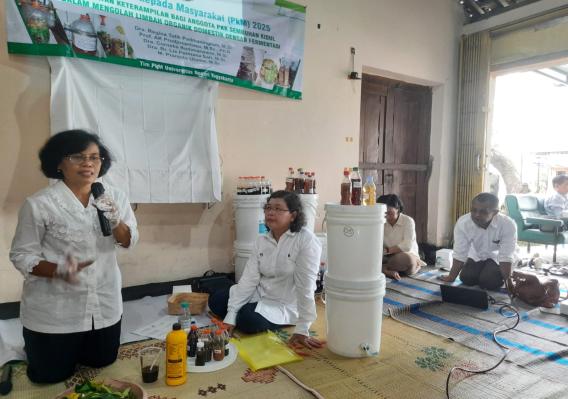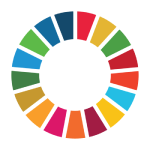UNY accompaniment: Turning organic waste into liquid fertilizer, the PKK mothers of Sembuhan Kidul become more independent

A team of UNY lecturers conducted an accompaniment programme in which 40 members of the women’s empowerment group (PKK) in Sembuhan Kidul participated. The goal of this activity was to increase the knowledge and skills of the community— especially housewives— in utilising household and garden organic waste so that it is not simply discarded, but processed into liquid organic fertilizer which can be useful for family farming as well as becoming an economically valuable product.
Through the training, participants gained hands-on experience, starting from sorting waste, making liquid fertilizer via fermentation, to methods of using the liquid organic fertilizer on plants. The activity didn’t only focus on the technical aspect, but also on empowering the community to become more independent and environmentally conscious.
The accompaniment was carried out by a UNY lecturer team led by Dra. Regina Tutik P., M.Si. and members M. Pranjoto Utomo, S.Si., M.Si., Dra. Cornelia Budimarwati, M.Si., Prof. A.K. Prodjosantoso, Ph.D, and Rr. Lis Permana Sari, M.Si. Their presence provided both academic and practical support in knowledge transfer to the community, enabling the activity to be structured, systematic, and oriented towards sustainability.
In addition, this programme has a strong connection with the achievement of the Sustainable Development Goals (SDGs), namely: SDG 3: Good Health and Well-being — through the reduction of potential environmental pollution. SDG 5: Gender Equality — because the programme involves the active role of the PKK mothers. SDG 11: Sustainable Cities and Communities — via household waste management that is environmentally friendly. SDG 12: Responsible Consumption and Production — by converting waste into a useful product. SDG 13: Climate Action — through reduction of emissions from unmanaged organic waste. One participant, Mrs Dewi, shared her experience: “We are greatly helped by this training. Until now we just threw kitchen waste away, but now we know how to process it into liquid fertilizer that can nourish plants in the yard.”
Team leader Dra Regina Tutik emphasized the importance of sustainability of the programme: “Our hope is that the PKK mothers will become the driving motor in organic waste management in the Sembuhan Kidul environment, so that they not only support family food security, but also contribute to environmental preservation in line with the spirit of the SDGs.” With this accompaniment activity, it is hoped that the PKK mothers in Sembuhan Kidul will not only be able to process organic waste independently, but also become community drivers in building environmental awareness. Moving forward, the production of this liquid organic fertilizer can be developed into a local flagship product that supports food security and at the same time increases family welfare.






